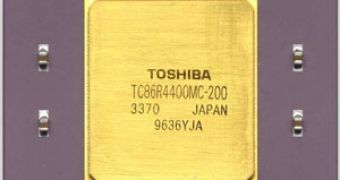In an attempt to gain back some market share from ARM Holdings, MIPS has just announced that the company plans to launch at least two 64-bit synthesizable cores this fall and that both chips will support multithreading and issue multiple instructions per clock cycle.
Dubbed Prodgy, this new family of processors is compatible with 32-bit MIPS software, uses a symmetrical multithreading approach, similar to that employed by the current MIPS 34K and 1004K 32-bit CPUs, and also supports thread contexts, virtual processing elements and inter-thread communications.
According to EETimes, at launch, the Prodigy family will include at least two products, a single-core single instruction per clock chip and a multi-core processor that will be capable of executing at least two instructions per clock.
In addition, this chip will run at least four threads per core, two virtual processors and nine thread contexts.
It is important to note that these won't be the first MIPS chips to be built using a 64-bit architecture since the R4000 core that was released back in 1991, and subsequently the 5K core, also supported 64-bit instructions.
However, both CPUs were limited to single-issue pipelines and lacked multithreading support so they were replaced with more powerful 32-bit parts.
Right now, the only 64-bit MIPS chips that are produced are manufactured by Cavium Networks and NetLogic who licensed this technology a while back.
"Entertainment and mobile processors will move to 64-bits very soon," said Gideon Intrater, vice president of product marketing at MIPS. "We believe the switch from 32 to 64 bits for these apps will happen in the life of this Prodigy family," he said.
"We're seeing set-top boxes with more than a Gbyte of memory today," concluded Mr. Intrater.
At this time, MIPS holds about 13 percent by revenue of the processor core market while its strongest competitor, ARM Holdings, commands two thirds of the market.
However, ARM hasn't released any 64-bit chips until now, so MIPS could gain a slight advantage if it got its new cores out to market as scheduled.

 14 DAY TRIAL //
14 DAY TRIAL //